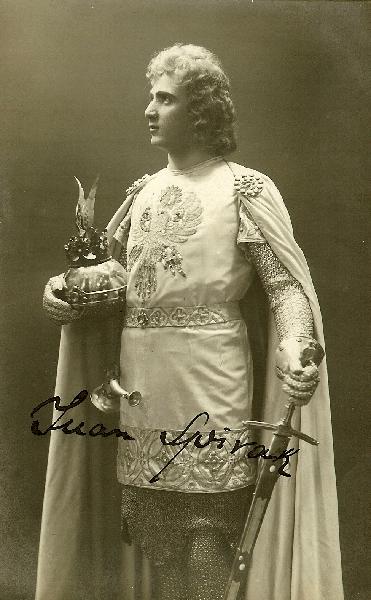Juan Spivak
28 April 1883 Philadelphia – 15 March 1946 New York
Spivak (also spelled Spiwak or Spiwack) was long thought to have been born in Slovenia, since that's what Kutsch
& Riemens wrote in their famous book that is quoted below:
From 1907 to 1909, Spivak was singing at the Wiener Volksoper. Here he had his first successes and sang often
with Maria Jeritza.
In 1909/10, Spivak sang at the Wiener Staatsoper: Barbier von Bagdad (Zweiter Muezzin, 10 times from 4 October 1909 to 16 April 1910;
Nureddin on 4 November 1909), Carmen (José on 6 January 1909).
His career evolved as follows:
1910/11 Opernhaus in Düsseldorf
1911/12 Theater in Olmütz (Olomouc)
1912–15 Stadttheater in Bremen
1915–22 Stadttheater in Nürnberg (world premiere of Ein Fest auf Haderslev by Robert Heger in 1919), where he also directed operas
1923–25 Stadttheater von Danzig, as singer und director
1927/28 Komische Oper Berlin, as singer und director
He made guest appearances at the Hoftheater in Stuttgart (1909), and at the Hoftheater in Wiesbaden (1911).
After retiring, he lived in Berlin, where he taught singing.
He left Germany in 1933 due to the political climate and emigrated to the USA. In New York,
he taught singing.
But in reality, Spivak was born in Philadelphia into a family of Russian immigrants:
application to regain US citizenship - SPIVAK early 1930's
- From: helenebergman@xxxxxxxxxxxx (Helene Bergman)
- Date: 28 Nov 2010 07:29:56 -0800
Having recently connected to a great-niece of my grandfather's first
cousin, I find that he was born in Philadelphia in 1883. His parents
(or maybe only father after mother's death) returned to Odessa and he
was raised by his grandparents, parents of my ggm. To ensure his
safety, they destroyed his US papers, and obtained Russian papers for
him. Here is her account:
According to Anki JENSEN SPIVAK, her husband, Juan SPIVAK, was born in
Philadelphia. He was born of Russian immigrants, but the family moved
back to Russia when he was only two years old. Because a pogrom had
been instituted against Jews in Russia at the time, only children born
in Russia would be allowed to stay, so the family decided to burn the
boy's American paperwork. For some reason Juan was brought up by his
grandparents in Odessa. That is why I don't know their names. He came
to Berlin at a very young age to take voice lessons. From there he went
to Vienna and had great success at the Wiener Staatsoper at the age of
only 21.
In 1926 Anki came from Stettin to Berlin and married Juan SPIVAK. I
don't know exactly when. Juan was singing 'Fuerst Igor' and 'Boris
Godunov'at the Berlin Staatsoper, while Anki sang 'Michaela' in Carmen
at 'Theater des Westens' and had a Strauss recital. Juan practiced
with her to expand her repertoire for the Berlin Staatsoper, where she
was later engaged. In 1929-30 the trouble started for the Jews and it
became hard to maintain employment. Juan now went on a tour with Jushny
and his 'Blaue Vogel' troup to Sweden, while Anki went to Paris and
London and was broadcast on the radio in both countries. When 'Der Blaue
Vogel' planned a trip to the US Anki was invited to be member of the group,
as well.
When they returned to Berlin their friends advised them to go back to the
U.S. and for Juan to get his American papers in order. He had to contact
family members in Paris, England, Italy and Russia and have all his
aunts sign papers to swear that it was true that he was born in
Philadelphia, USA and that his papers had been burnt in Russia. He
immigrated to the U.S. in 1933, but Anki had to wait one and a half
long years before she was able to enter the country, let alone get a
working permit, since it took this long for the paperwork to be in order.
I have written about this SPIVAK family before, and this seems like a
solid lead. Does anyone know from where I could obtain whatever papers
Juan filed with the US government? Those petitions would help establish
the name of the ancestors who moved to these other cities (I have a photo
of the one who went to London).
Thanks in advance for any leads...
Lanie Bergman
Bronx NY
Reference: Der Keiler, website for genealogical research
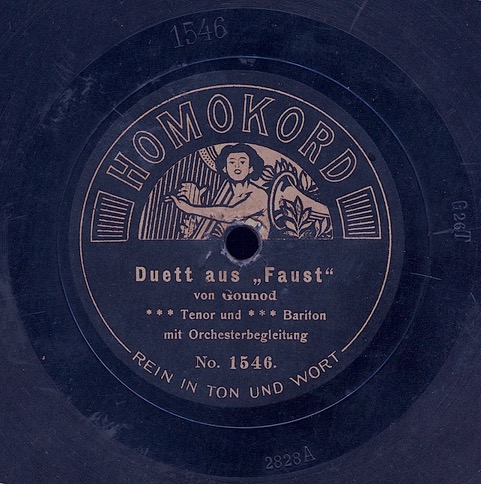
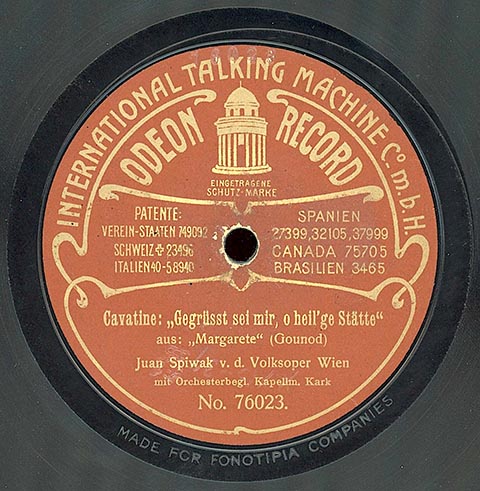
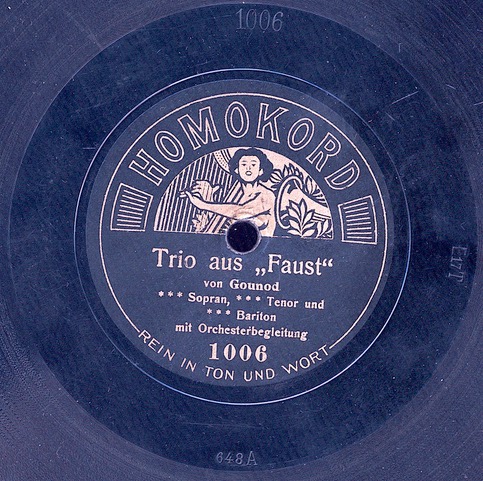
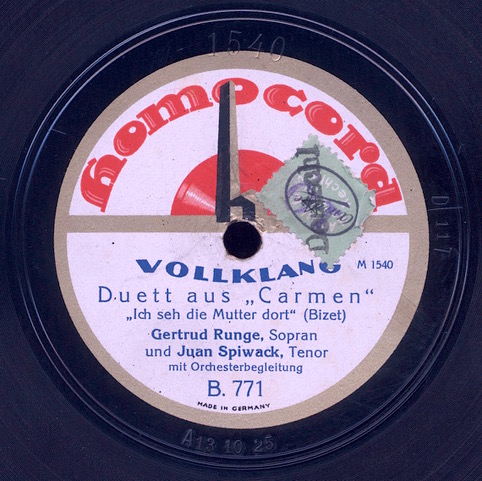
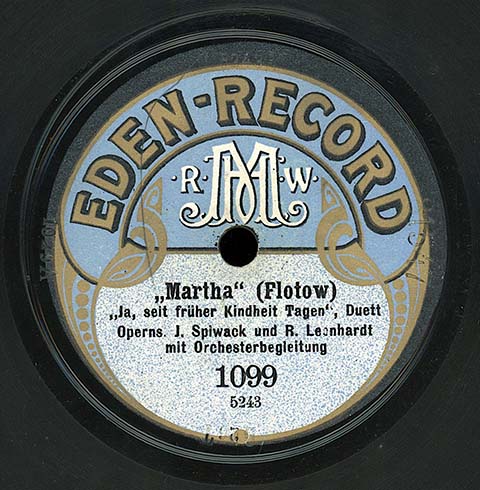
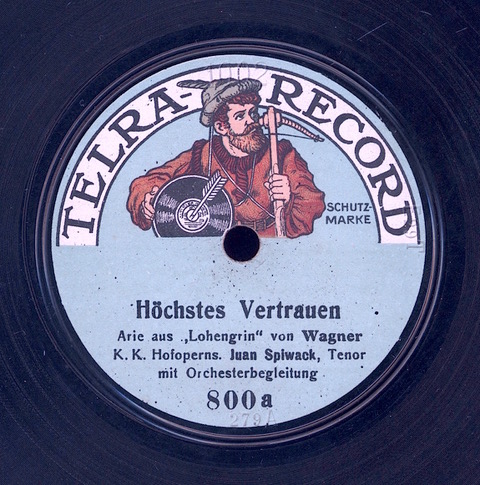
In RA format
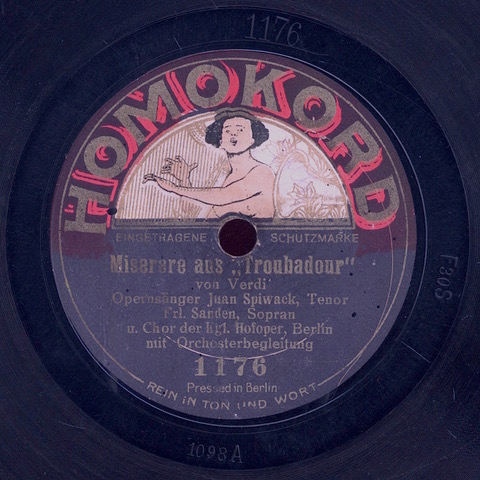
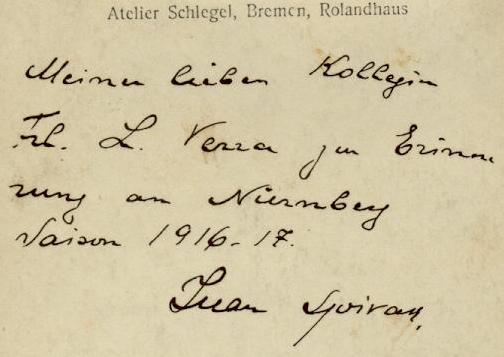
Discography
Favorite, Berlin, September 1905
420-o Azra (Rubinstein) 1-75006
421-o Evgenij Onegin (Chajkovskij): Kuda, kuda 1-75001
422-o Pikovaja dama (Chajkovskij): Prosti, nebesnoe sozdanye 1-75002
439-o Aida (Verdi): Milaja Aida 1-75003
440-o Demon (Rubinstein): Obernuvshis sokolom 1-75004
441-o Rigoletto (Verdi): Questa o quella 1-75005
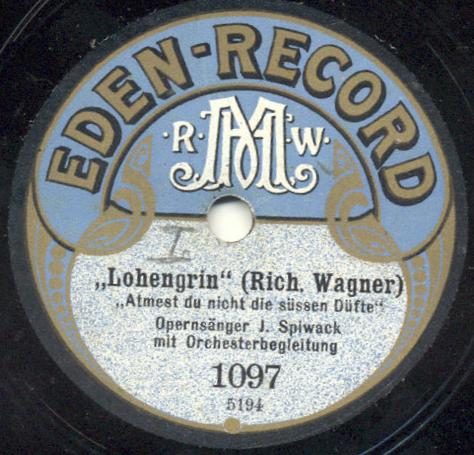 Homocord, Berlin, 23 March 1907
Il trovatore (Verdi): Einsam steh' ich 1001, B838
Il trovatore (Verdi): Einsam steh' ich 1056, B779
Pagliacci (Leoncavallo): Hüll dich in Tand nur 1054, B785, Eden 1086
Homocord, Berlin, 27 March 1907
Lohengrin (Wagner): Nun sei bedankt 1057, B786, Sigurd P518a
Il trovatore (Verdi): Lodern zum Himmel 1058, B780
Pagliacci (Leoncavallo): Ich wünscht', ach, dass im Fieber 1059, B780
Carmen (Bizet): Hier an dem Herzen 1060, B779, Eden 1088
Rigoletto (Verdi): Freundlich blick' ich 1061
Homocord, Berlin, 9 April 1907
Lohengrin (Wagner): O Elsa 1053, B786
Rigoletto (Verdi): O wie so trügerisch 1055, B775
Lohengrin (Wagner): In fernem Land 1065, B776, Eden 1096
Die Walküre (Wagner): Winterstürme 1083, B784, Sigurd P518b
Die Meistersinger von Nürnberg (Wagner): Morgenlich leuchtend 1099, B784
Cavalleria rusticana (Mascagni): O Lola, rosengleich 1100, B785
Der Asra (Rubinstein) 1102
Homocord, Berlin, 11 April 1907
Il trovatore (Verdi): In uns're Heimat (w. Runge) 1502, Telra 810a
Carmen (Bizet): Ich seh' die Mutter dort (w. Runge) 1540, B771, Eden 1088
Traviata (Verdi): So hold, so reizend 1542, B771, Novitas 1208
Odeon, Berlin, May 1907
xB 28.. Towau l'fonecho (L. Lewandowski) X 23842, X 35819, O-5156
Homocord, Berlin, 17 May 1907
Aida (Verdi): O wäre ich erkoren 1004a, B778
Aida (Verdi): Holde Aida 1004b, B778
648A Faust (Gounod): Auf eilet! Auf eilet! (w. Ellis & Nebe) 1006, B772, Eden 1092
Sieh, nun fliehet des Winters Macht (= Au printemps) (Gounod) 1112, B775
Homocord, Berlin, 29 May 1907
279A Lohengrin (Wagner): Höchstes Vertrauen 1002, B777, Eden 1097, Telra 800a
Homocord, Berlin, 15 July 1907
Faust (Gounod): Gegrüßt sei mir 1068, Eden 1091
Homocord, Berlin, 22 July 1907
La Juive (Halévy): Recha, als Gott dich einst 1027, Eden 1109
Homocord, Berlin, 23 July 1907
Lohengrin (Wagner): Atmest du nicht mit mir 1052, B777, Eden 1097, Telra 800b
Homocord, Berlin, 26 July 1907
2828A Faust (Gounod): O gib junges Blut (w. Leonhardt) 1546, B772
Martha (Flotow): Ja, seit früher Kindheit Tagen (w. Leonhardt) 1547, B770
Homocord, Berlin, 5 August 1907
Tosca (Puccini): Und es blitzten die Sterne 1106, B781, Eden 1109
Homocord, Berlin, 23 March 1907
Il trovatore (Verdi): Einsam steh' ich 1001, B838
Il trovatore (Verdi): Einsam steh' ich 1056, B779
Pagliacci (Leoncavallo): Hüll dich in Tand nur 1054, B785, Eden 1086
Homocord, Berlin, 27 March 1907
Lohengrin (Wagner): Nun sei bedankt 1057, B786, Sigurd P518a
Il trovatore (Verdi): Lodern zum Himmel 1058, B780
Pagliacci (Leoncavallo): Ich wünscht', ach, dass im Fieber 1059, B780
Carmen (Bizet): Hier an dem Herzen 1060, B779, Eden 1088
Rigoletto (Verdi): Freundlich blick' ich 1061
Homocord, Berlin, 9 April 1907
Lohengrin (Wagner): O Elsa 1053, B786
Rigoletto (Verdi): O wie so trügerisch 1055, B775
Lohengrin (Wagner): In fernem Land 1065, B776, Eden 1096
Die Walküre (Wagner): Winterstürme 1083, B784, Sigurd P518b
Die Meistersinger von Nürnberg (Wagner): Morgenlich leuchtend 1099, B784
Cavalleria rusticana (Mascagni): O Lola, rosengleich 1100, B785
Der Asra (Rubinstein) 1102
Homocord, Berlin, 11 April 1907
Il trovatore (Verdi): In uns're Heimat (w. Runge) 1502, Telra 810a
Carmen (Bizet): Ich seh' die Mutter dort (w. Runge) 1540, B771, Eden 1088
Traviata (Verdi): So hold, so reizend 1542, B771, Novitas 1208
Odeon, Berlin, May 1907
xB 28.. Towau l'fonecho (L. Lewandowski) X 23842, X 35819, O-5156
Homocord, Berlin, 17 May 1907
Aida (Verdi): O wäre ich erkoren 1004a, B778
Aida (Verdi): Holde Aida 1004b, B778
648A Faust (Gounod): Auf eilet! Auf eilet! (w. Ellis & Nebe) 1006, B772, Eden 1092
Sieh, nun fliehet des Winters Macht (= Au printemps) (Gounod) 1112, B775
Homocord, Berlin, 29 May 1907
279A Lohengrin (Wagner): Höchstes Vertrauen 1002, B777, Eden 1097, Telra 800a
Homocord, Berlin, 15 July 1907
Faust (Gounod): Gegrüßt sei mir 1068, Eden 1091
Homocord, Berlin, 22 July 1907
La Juive (Halévy): Recha, als Gott dich einst 1027, Eden 1109
Homocord, Berlin, 23 July 1907
Lohengrin (Wagner): Atmest du nicht mit mir 1052, B777, Eden 1097, Telra 800b
Homocord, Berlin, 26 July 1907
2828A Faust (Gounod): O gib junges Blut (w. Leonhardt) 1546, B772
Martha (Flotow): Ja, seit früher Kindheit Tagen (w. Leonhardt) 1547, B770
Homocord, Berlin, 5 August 1907
Tosca (Puccini): Und es blitzten die Sterne 1106, B781, Eden 1109
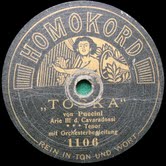 Homocord, Berlin, 19 August 1907
Cavalleria rusticana (Mascagni): Nein, nein, Turiddu (w. Leux) 1548
Homocord, Berlin, 21 August 1907
Cavalleria rusticana (Mascagni): No, no, Turiddu (w. Goldberg) 4107
Homocord, Berlin, 27 August 1907
Bruder Straubinger (Eysler): Küssen ist keine Sünd' 1787, Telra 806b
Cavalleria rusticana (Mascagni): Schäumt der süße Wein im Becher 1788, B765
Homocord, Berlin, 31 August 1907
Aida (Verdi): Schon sind die Priester all vereint (w. Leux) 1539, Eden 1117
Aida (Verdi): Già i sacerdoti adunansi (w. Karri) 4105
Pathé, Wien, March 1908?
38659 Il trovatore (Verdi): Wilde Eifersucht im Herzen (w. Jeritza & Melms) 38659
38667 Pagliacci (Leoncavallo): Hüll dich in Tand nur 38667
38668 Tosca (Puccini): Und es blitzten die Sterne 38668
38669 Manon Lescaut (Puccini): Manon, o schändlich 38669
38670 Lohengrin (Wagner): Das süße Lied verhallt (w. Jeritza) 38670
38679 Die Walküre (Wagner): Winterstürme wichen dem Wonnemond 38679
38680 Aida (Verdi): Holde Aida 38680
38681 Der Freischütz (Weber): Durch die Wälder 38681
38682 Rigoletto (Verdi): Freundlich blick' ich 38682
38683 Manon Lescaut (Puccini): Du, du Geliebter (w. Jeritza) 38683, IRCC L-7015
Odeon, Berlin, May 1908
xB 3901 Carmen (Bizet): Eine Linie tiefer (w. Luria) X 99199, X 51355
xB 3902 Il trovatore (Verdi): Rings tiefes Schweigen! (w. Luria) X 99031, X 51351
xB 3903 Tosca (Puccini): Wie sich die Bilder gleichen X 64997, X 25057
xB 3904 Tosca (Puccini): Und es blitzten die Sterne X 64992, X 25056
xB 3922 Faust (Gounod): O gib junges Blut (w. Stammer) X 51352, X 99016
xB 3924 Il trovatore (Verdi): Wilde Eifersucht im Herzen (w. Luria & Sanden) X 51350, X 99017
xB 3925 Martha (Flotow): Wie das schnattert, wie das plappert (w. Luria) X 99006, X 51354
Homocord, Berlin, 25 May 1908
Pagliacci (Leoncavallo): Scherzet immer 1062, B767, Eden 1086
Jocelyn (Godard): Am stillen Zufluchtsort 1063, B783
Odeon, Berlin, June 1908
xxB 3938 Faust (Gounod): Gegrüßt sei mir, o heil'ge Stätte unpublished
xxB 3951 Faust (Gounod): Gegrüßt sei mir, o heil'ge Stätte XX 76023, AA 56989
xB 3952 Pagliacci (Leoncavallo): Scherzet immer, doch eines schont X 25132, X 99085
xB 3953 Pagliacci (Leoncavallo): Hüll' dich in Tand nur X 25133, X 99075
xB 3966 Manon Lescaut (Puccini): Wo lebte wohl ein Wesen X 99054, X 25229
xB 3967 Manon Lescaut (Puccini): Ha, wagt's, sie zu berühren X 99041, X 25228
xB 3969 Pagliacci (Leoncavallo): Nein, bin Bajazzo nicht bloß X 25534
xB 3970 Guillaume Tell (Rossini): O Mathilde (w. Luria) X 99060, X 51353
Homocord, Berlin, 30 June 1908
Il trovatore (Verdi): Wilde Eifersucht im Herzen (w. Luria & Sanden) 1069, B767, Eden 1105
Carmen (Bizet): Eine Linie tiefer (w. Luria) 1070, B764, Eden 1117
Les cloches de Corneville (Planquette): Fahr hin, Matrose 1071, B782
Les cloches de Corneville (Planquette): Die Reise um die ganze Erde 1072, B782
Africaine (Meyerbeer): Land so wunderbar 1073, B781, B783
Il trovatore (Verdi): Einsam steh' ich (w. Luria) 1074, B764, Telra 809a
1098A Il trovatore (Verdi): Hab Erbarmen, o Herr (w. Sanden) 1176, B734
Gramophone, Wien, 6 June 1911
12505L Fliederlied (Zerkovitz) 242120, 12164
12506L Das Lied der Mutter (Zerkovitz) unpublished
12506½L Das Lied der Mutter (Zerkovitz) 242121, 12164
Homocord, Berlin, 19 August 1907
Cavalleria rusticana (Mascagni): Nein, nein, Turiddu (w. Leux) 1548
Homocord, Berlin, 21 August 1907
Cavalleria rusticana (Mascagni): No, no, Turiddu (w. Goldberg) 4107
Homocord, Berlin, 27 August 1907
Bruder Straubinger (Eysler): Küssen ist keine Sünd' 1787, Telra 806b
Cavalleria rusticana (Mascagni): Schäumt der süße Wein im Becher 1788, B765
Homocord, Berlin, 31 August 1907
Aida (Verdi): Schon sind die Priester all vereint (w. Leux) 1539, Eden 1117
Aida (Verdi): Già i sacerdoti adunansi (w. Karri) 4105
Pathé, Wien, March 1908?
38659 Il trovatore (Verdi): Wilde Eifersucht im Herzen (w. Jeritza & Melms) 38659
38667 Pagliacci (Leoncavallo): Hüll dich in Tand nur 38667
38668 Tosca (Puccini): Und es blitzten die Sterne 38668
38669 Manon Lescaut (Puccini): Manon, o schändlich 38669
38670 Lohengrin (Wagner): Das süße Lied verhallt (w. Jeritza) 38670
38679 Die Walküre (Wagner): Winterstürme wichen dem Wonnemond 38679
38680 Aida (Verdi): Holde Aida 38680
38681 Der Freischütz (Weber): Durch die Wälder 38681
38682 Rigoletto (Verdi): Freundlich blick' ich 38682
38683 Manon Lescaut (Puccini): Du, du Geliebter (w. Jeritza) 38683, IRCC L-7015
Odeon, Berlin, May 1908
xB 3901 Carmen (Bizet): Eine Linie tiefer (w. Luria) X 99199, X 51355
xB 3902 Il trovatore (Verdi): Rings tiefes Schweigen! (w. Luria) X 99031, X 51351
xB 3903 Tosca (Puccini): Wie sich die Bilder gleichen X 64997, X 25057
xB 3904 Tosca (Puccini): Und es blitzten die Sterne X 64992, X 25056
xB 3922 Faust (Gounod): O gib junges Blut (w. Stammer) X 51352, X 99016
xB 3924 Il trovatore (Verdi): Wilde Eifersucht im Herzen (w. Luria & Sanden) X 51350, X 99017
xB 3925 Martha (Flotow): Wie das schnattert, wie das plappert (w. Luria) X 99006, X 51354
Homocord, Berlin, 25 May 1908
Pagliacci (Leoncavallo): Scherzet immer 1062, B767, Eden 1086
Jocelyn (Godard): Am stillen Zufluchtsort 1063, B783
Odeon, Berlin, June 1908
xxB 3938 Faust (Gounod): Gegrüßt sei mir, o heil'ge Stätte unpublished
xxB 3951 Faust (Gounod): Gegrüßt sei mir, o heil'ge Stätte XX 76023, AA 56989
xB 3952 Pagliacci (Leoncavallo): Scherzet immer, doch eines schont X 25132, X 99085
xB 3953 Pagliacci (Leoncavallo): Hüll' dich in Tand nur X 25133, X 99075
xB 3966 Manon Lescaut (Puccini): Wo lebte wohl ein Wesen X 99054, X 25229
xB 3967 Manon Lescaut (Puccini): Ha, wagt's, sie zu berühren X 99041, X 25228
xB 3969 Pagliacci (Leoncavallo): Nein, bin Bajazzo nicht bloß X 25534
xB 3970 Guillaume Tell (Rossini): O Mathilde (w. Luria) X 99060, X 51353
Homocord, Berlin, 30 June 1908
Il trovatore (Verdi): Wilde Eifersucht im Herzen (w. Luria & Sanden) 1069, B767, Eden 1105
Carmen (Bizet): Eine Linie tiefer (w. Luria) 1070, B764, Eden 1117
Les cloches de Corneville (Planquette): Fahr hin, Matrose 1071, B782
Les cloches de Corneville (Planquette): Die Reise um die ganze Erde 1072, B782
Africaine (Meyerbeer): Land so wunderbar 1073, B781, B783
Il trovatore (Verdi): Einsam steh' ich (w. Luria) 1074, B764, Telra 809a
1098A Il trovatore (Verdi): Hab Erbarmen, o Herr (w. Sanden) 1176, B734
Gramophone, Wien, 6 June 1911
12505L Fliederlied (Zerkovitz) 242120, 12164
12506L Das Lied der Mutter (Zerkovitz) unpublished
12506½L Das Lied der Mutter (Zerkovitz) 242121, 12164
Many thanks to Anton Bieber for seven recordings plus label scans (3x Faust, Carmen, Miserere, Lohengrin, Martha).
Discography source: Gesellschaft für historische Tonträger, Wien
|








